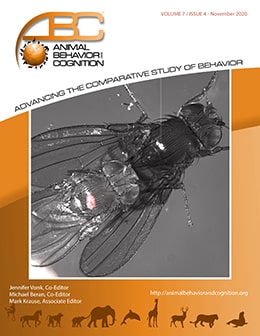Vol 7, Issue 4, November 2020
Can Comparative Psychology Crack its Toughest Nut?
Citation
Povinelli, D.J. (2020). Can comparative psychology crack its toughest nut? Animal Behavior and Cognition, 7(4), 589-652. https://doi.org/10.26451/abc.07.04.09.2020
Abstract
What is the likelihood that humans will ever determine if other animals engage in higher-order thinking? In examining what has happened in the twenty years since the publication of our book, Folk Physics for Apes, I conclude that comparative psychologists, the academic stalwarts charged with making progress on this front, are stuck in a series of intractable, and largely unacknowledged, conceptual problems. Because higher-order mental states depend on the existence of first-order, perceptually-based representations of objects and events, and because those first-order representations are necessary and sufficient to explain current experimental and observational results, the approaches deployed by comparative psychologists are doomed to failure. I examine this Asymmetric Dependency Problem in detail and show how the failure to confront its implications leads to viciously circular arguments that cannot be fixed within the current paradigm of research. Next, I offer a seven-step method for isolating the common structural flaw in any given experiment, and work through several examples. Finally, I examine the central claims that my colleagues and I made in Folk Physics through the lens of the Asymmetric Dependency Problem and current research trends. Although the optimism we expressed that experimental approaches could implicate the presence of higher-order thinking in animals requires considerable dampening, the challenges we isolated remain as vital today as they were twenty years ago.
Keywords
Folk physics, Theory of Mind, Chimpanzees, Comparative Psychology, Higher-order Cognition
